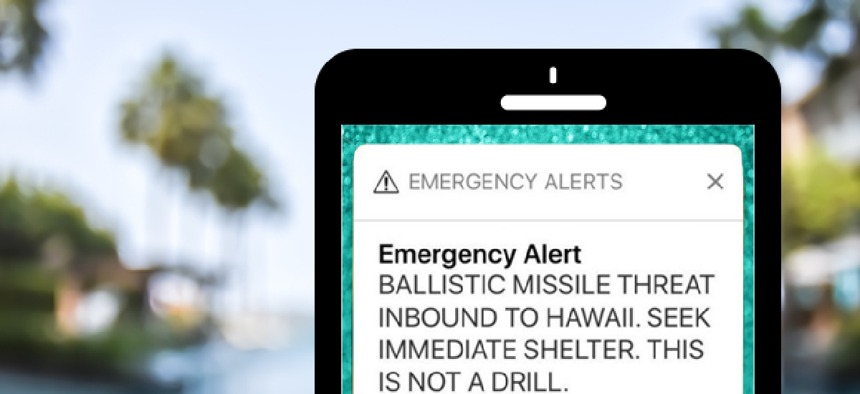Hawaii false alarm a 'harrowing' experience, state's senator says


Connecting state and local government leaders
A Senate panel explored the causes behind the recent mistaken broadcast of an emergency alert.
Sen. Brian Schatz (D-Hawaii) was at his home in Honolulu earlier this month when a state government employee accidentally triggered an emergency alert that said a ballistic missile was headed for the state.
“People were terrified as they tried to get in touch with loved ones,” Schatz said during a Senate Science, Commerce and Transportation Committee hearing about emergency alert systems like the one that sent the message to people in Hawaii. “I know because I was home in Honolulu that morning and started to get dozens of texts with screen shots of the push alert.”
Schatz described the time between receiving the message and the correction as “one of the most harrowing hours” for the people who experienced it.
The emergency alert system allows governments down to the county level to send out messages to phones and television screen for issues ranging from dangerous weather conditions to a kidnapped child or an incoming missile. The Federal Emergency Management Agency certifies non-federal agencies to use the system -- a policy Schatz questioned in the Jan. 25 hearing.
These lower-level governments aren’t experts in knowing if a missile is coming toward their constituents, he said, noting that such information would come from the Department of Defense and the Department of Homeland Security.
As a result, Schatz is introducing legislation that would allow only DOD and DHS to issue alerts regarding missile attacks.
If lawmakers came to the hearing expecting answers on avoiding future mistaken alerts, they likely left unsatisfied. The only federal witness was Lisa M. Fowlkes, the chief for public safety and homeland security bureau at the Federal Communications Commission. She repeatedly referred lawmakers' questions to FEMA.
The FCC regulates the communications providers – radio and telecom companies and broadcasters -- that send out the messages. But the FCC doesn’t have any say in who sends out messages, what the messages are sent for or anything involving the creation of the message prior to its arrival at a provider, Fowlkes said.
Nevertheless, the FCC is looking into the incident and has sent two investigators to the state. The alert was a result of human error and the state not having any safeguards in place to prevent that kind of mistake, she said.
“The Hawaii Emergency Management Agency tells us that it is working with its vendor to integrate additional technical safeguards into its alert origination software and has changed its protocol to require two individuals to sign off on the transmission of tests and live alerts,” Fowlkes told lawmakers.
One person of interest, she told the panel, has not cooperated with the FCC. “We are disappointed, however, that one key employee -- the person who transmitted the false alert -- is refusing to cooperate with our investigation," she said. "We hope that person will reconsider.”
Lawmakers asked Fowlkes about regulatory or technical changes that should be made to prevent this from happening in the future, but she said that would be FEMA’s area.
At the Senate Commerce Committee’s request, FEMA briefed a bipartisan group of staff last week, according to a FEMA spokesperson. The agency "will continue to remain engaged with this Committee, and others, who have a responsibility to conduct oversight on this important matter,” the spokesperson said.
Industry association representatives did talk about emergency alert system network upgrades, though. Rules passed in 2016 by the FCC will expand the character count for alerts from 90 to 360. The same rules will allow broadcasters to send links and media files, including video-on-demand descriptions. In 2019, the system will also add blue alerts, which are notifications of danger to law enforcement or a dangerous suspect.
The Senate plans to hold a field hearing in Hawaii on the topic of this month’s false alarm, but a date has not yet been posted.
Editor's note: This article was updated Jan. 26 with a response from FEMA.




